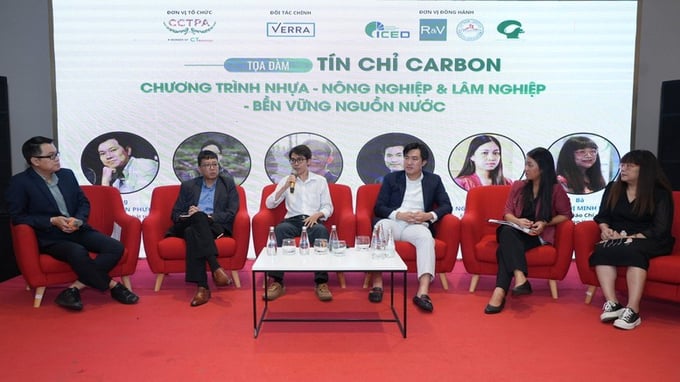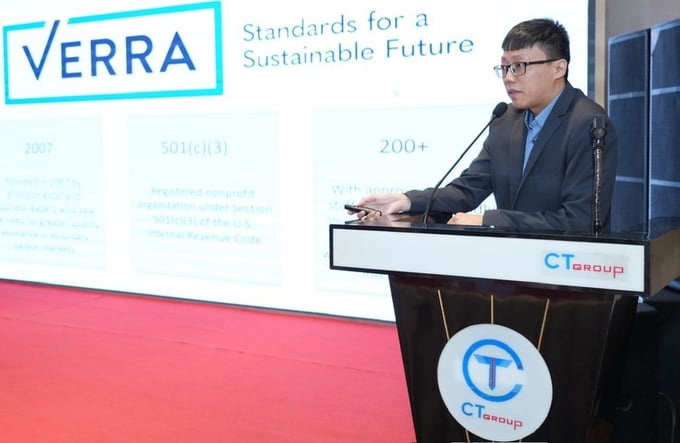May 30, 2025 | 18:31 GMT +7
May 30, 2025 | 18:31 GMT +7
Hotline: 0913.378.918
May 30, 2025 | 18:31 GMT +7
Hotline: 0913.378.918

Experts, businesses, and speakers discussed at the seminar. Photo: Hong Duc.
The event attracted many delegates from agencies, sectors, business associations, non-profit organizations, and environmental experts, plastic waste, agriculture, forestry, and water resource management... The speakers shared the challenges of today's hot environmental issues and introduced breakthrough solutions that contribute to solving these problems, aiming to promote circular economic development.
Plastic pollution is a burning problem globally, including in Vietnam. According to statistics, Vietnam generates about 1.8 million tons of plastic waste yearly, but only 27% is recycled. However, plastic is also a critical manufacturing and supporting industry with great potential because plastic products are applied in all areas of life. Applying a circular economy to the plastics sector will bring many benefits, including reducing pollution and greenhouse gas emissions and creating green livelihoods.
Currently, the traditional export markets of Vietnamese plastic enterprises are European countries, America, Japan, and ASEAN. In the context of more and more markets requiring CBAM (Carbon Border Adjustment Mechanism) and sustainability reporting, the Vietnamese plastics industry needs to activate and exploit the potential of carbon credits. Participating in the carbon credit market, Vietnam's plastic industry can minimize environmental impact, improve competitiveness, and promote a circular economy.
Mr. Win Sim Tan - VERRA's Chief Representative for East and Southeast Asia, shared: "Plastic waste has become an important concern for companies, governments, and consumers worldwide. Program VERRA's plastic pollution reduction can assess the impact of waste collection and recycling projects; projects qualify for plastic credits. It is also a powerful and effective means of reducing environmental plastic waste".
Carbon credits are tradable licenses or certificates that give the credit holder the right to emit one ton of carbon dioxide or the equivalent of another greenhouse gas. The main goal of creating carbon credits is to reduce emissions of carbon dioxide and other greenhouse gases from industrial activities to minimize the impact of global warming.
In Vietnam, the ASEAN Carbon Credit Exchange Joint Stock Company (CCTPA) is VERRA's first and official partner in carbon credit projects and climate change prevention programs.

Mr. Win Sim Tan shared about the Plastic Pollution Reduction Program and carbon credits. Photo: Hong Duc.
Opportunities to participate in the carbon credit market are also highly open to the agriculture and forestry sectors. According to calculations, the agriculture sector alone can reach 57 million carbon credits per year, while the forestry sector can sell about 40 million carbon credits per year. Selling carbon credits will help forest owners and farmers improve sustainable livelihoods while reducing greenhouse gas emissions, contributing to environmental protection, and responding to climate change.
Experts say that the carbon credit trading market will become increasingly vibrant. Therefore, Vietnam's agriculture and forestry industry needs to stay ahead of this trend to increase profits. The Mekong Delta region is considered to have great potential in this market.
According to estimates by the World Bank, establishing a specialized, high-quality rice growing area in the Mekong Delta can reduce 10 million tons of carbon, earning about USD 100 million. Carbon credits can be generated from forest planting, care, protection and development activities, vegetation regeneration, or the application of technology to capture and use methane gas in farming and animal husbandry activities.
Mr. Nguyen Vo Truong An - Deputy General Director of CCTPA shared: "CCTPA will provide complete consulting information for businesses, organizations and individuals in Vietnam on how to build carbon credit projects, how to Registration, verification, certification and exchange, compensation, credit mechanisms for carbon credits and application of carbon taxes regionally and globally Based on emissions reduction goals, CCTPA also advises on specific measures to reduce carbon emissions, including using renewable energy, optimizing production processes and deploying clean, carbon-free technologies."
Mr. An added: "The discussion is also a long-term, non-profit activity, aiming to share knowledge about sustainable projects, not only in the manufacturing industry but also to accompany the people of the Mekong Delta to reduce the hard part".
Vietnam is a pioneer country committed to reducing net carbon emissions to zero (Net Zero) by 2050. The commitment demonstrates Vietnam's responsibility to the international community for sustainable economic development. According to the roadmap, the Government aims to pilot the carbon credit exchange market operation by 2025. Therefore, businesses need to adapt to new trends proactively and should be prepared in the process of building and planning strategies to reduce emissions in each stage of production.
Translated by Huong Giang

(VAN) Vaccinating juvenile pangasius helps reduce disease, antibiotic use, and farming costs, increasing profits for export-oriented farmers in An Giang.

(VAN) Due to a limited supply of workforce and competitive recruitment requirements, businesses struggle to retain talented veterinary human resources.

(VAN) WOAH’s guidance aims to mitigate disease risks through a One Health approach that balances economic, conservation, and public health interests.

(VAN) Ms. Nguyen Thi Dung, Deputy Director of Ngoc Hoang Cooperative, shared about the journey of bringing dragon fruit to Europe, achieving annual revenues in the billions of VND.

(VAN) Bamboo products from Thang Tho Bamboo Cooperative have reached many countries around the world, while also creating jobs for local workers.

(VAN) The Management Board of Con Dao National Park reported that a green sea turtle, tagged in the Philippines, has traveled thousands of kilometers to lay 84 eggs on Bay Canh Islet.

(VAN) Green technology is paving a new path for sustainable aquaculture in the Mekong Delta in particular and across the country in general, helping reduce emissions and adapt to climate change.